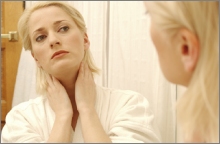Lumps and Bumps to Watch Out For:
Detecting Cancer & Other Health Issues
by www.SixWise.com
Cancer experts recommend regularly checking your body for lumps or bumps that appear out of the ordinary. Should you discover something that is, in fact, cancer finding it early will give you the best chance to overcome it.
|

You have the best knowledge of what looks or feels unusual about your body, so trust your instincts and see a doctor if something is out of the ordinary.
|
Here's a breakdown of what to keep an eye out for.
Breast Lumps
Experts recommend that women do a breast self-exam once a month to check for anything out of the ordinary. Feel for distinct lumps along with areas of "thickness," skin redness, distension, dimpling or pitting, asymmetry, pain, nipple inversion or unusual nipple discharge.
While most breast lumps are noncancerous, you should see a doctor right away if:
-
The lump is new or unusual
-
The area feels different from surrounding tissue in that breast or your other breast
-
The lump has changed (gotten bigger, firmer or more defined)
-
You have bloody discharge from your nipple
-
You notice skin changes on your breasts (redness, crusting, dimpling, puckering)
-
Your nipple is turned inward (if it normally isn't)
|
Stretch Your Way to a Healthier Life
 Proper stretching is one of the most widely recommended methods to help you look and feel younger, live longer, avoid and even overcome serious health issues, and increase your mental concentration, energy and emotional well-being. Proper stretching is one of the most widely recommended methods to help you look and feel younger, live longer, avoid and even overcome serious health issues, and increase your mental concentration, energy and emotional well-being.
With the "Stretching Toward a Healthier Life" DVD, you'll:
- Reduce tension in your muscles
- Improve the flow of oxygen and the intake of essential nutrients
- Help reduce and manage stress
- Improve your posture
- Get better blood circulation
- Have more energy to perform daily tasks
Learn more about "Stretching Toward a Healthier Life," including how to get FREE SHIPPING for a Limited Time Now!
|
Testicular Lumps
Men should examine their testicles for lumps at least once a month, beginning in their mid-teens. This should ideally be done after a shower or bath, as the heat from the water relaxes your scrotum, which makes it easier to find abnormalities.
If you detect any pain, swelling or lumps (even non-painful ones) in your testicles or groin area, you should see a doctor immediately.
Skin Bumps and Lumps
Most skin cancers spotted early on are curable. The Skin Cancer Foundation recommends getting a yearly skin exam by your doctor, along with performing your own self-examination once a month.
You should check all areas of your body -- even those not exposed to the sun. This includes your scalp, palms of hands, soles of feet, underarms, stomach, and even inside your mouth. Use a mirror for those hard-to-see places. You're looking for what The Skin Cancer Foundation and other organizations call the "ABCDs" of moles and melanoma.
Here's what to look for:
 |
- Asymmetry: Most melanomas are asymmetric (a line down the middle will not split it evenly in half).
|
 |
- Border: Melanomas may have irregular borders with scalloped or notched edges. Normal moles will have a smoother border.
|
 |
- Color: Melanomas typically have varied shades of brown, tan or black, and may later progress to red, white and blue. Normal moles are usually a single shade of brown.
|
 |
- Diameter: A melanoma may be larger than a regular mole, or at least the size of a pencil eraser (about 1/4 inch in diameter). They may be smaller, however.
|
Further, you should watch for changes in regular moles, such as changes in color, size, elevation, sensation (like itching) or shape. If you notice anything suspicious, see your doctor right away.
Recommended Reading
Smoke or Used to Smoke? The Healthiest Foods to Prevent Lung Cancer and Other Smoker's Diseases
The 8 Most Unusual Sources of Potential Cancer Cures
Sources
MayoClinic.com: Testicular Cancer
MayoClinic.com Breast Lumps